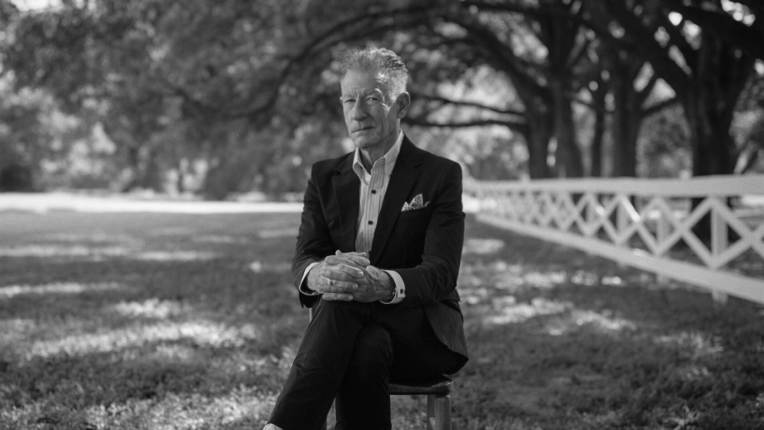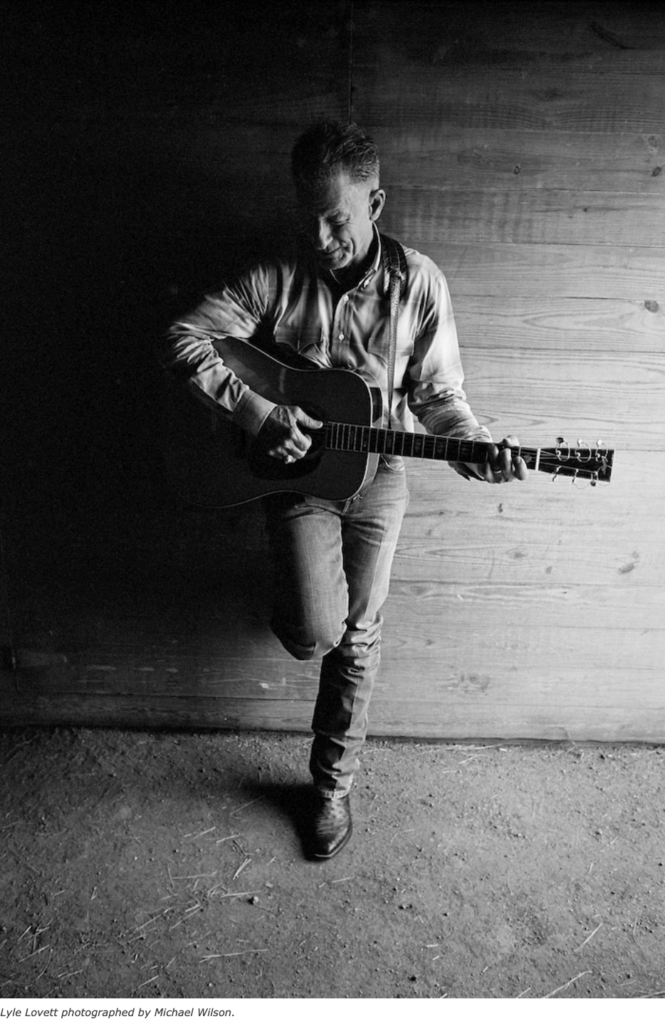
Farther Down The Line: An Interview With Lyle Lovett
By Don Harrison
Talking Texas, touring large and Robert Altman with the great Lyle Lovett.
By Don Harrison (WTJU Rock host of Radio Wowsville, Sundays, 11 p.m. – 1 a.m.)
Lyle Lovett says he likes being part of a team, whether serving as the centerpiece in a 30-person caravan traveling the country performing music, or being a player in an ensemble cast on a movie set.
“Maybe it’s because I was an only child growing up,” says the iconic singer-songwriter, who will bring his Large Band (and crew) to the Dominion Energy Center’s Carpenter Theater on Sunday, July 27. “I love being around a team of people all pulling in the same direction, all trying to make what we’re doing the best it can possibly be. I love the process. For me, it’s not so much about the end result as it is the continuing process of just trying to be better every day.”
Armed with wry, often sardonic original songs like “She’s No Lady” and “Don’t Touch My Hat,” Houston, Texas native Lovett has been straddling the genres of country, pop, blues and jazz since he emerged in the mid-’80s as the latest in a line of Lone Star cosmic cowboys and girls from Willie Nelson and Guy Clark to his mentor, Nanci Griffith. The New Yorker wrote that “Lovett reveals his weird splendor in a schizophrenic jumble of smoky jazz and twangy country that revives whole swaths of neglected popular American music.”
The 14-piece, Lyle Lovett and His Large Band concept, which he initiated on a Grammy-winning album of the same name in 1989, has enabled him to stretch out and carve a unique, open space that takes in Louis Armstrong as much as Hank Williams. His most recent album, “The 12th of June,” often dives into straight, unfiltered big band jazz — about as far from contemporary country as you can get. “In record stores, I used to get filed in the country section,” he says. “But eventually, they didn’t know where to put me.”
In addition to releasing 14 albums, copping four Grammys in his stride, the angular-faced singer has found a rewarding side career as an actor, most notably in four films directed by the late Robert Altman (he also scored an Altman film, “Dr. T & The Women”). Style Weekly recently spoke to Lovett about discovering music as a kid, his early days as a Texas troubadour, the art of being a musical chameleon, and what he’s learned from his experiences as an actor.
Style Weekly: On record and in concert, you are just as likely to break out into a swing jazz tune as you are a country ballad. When you started out, did you aspire to be a kind of musical polymath?
Lyle Lovett: Oh no. None of what I do started out to be conceptual. I credit producer Billy Williams, who arranged much of my earlier work. Billy helped me. We’d listen to my songs I wanted to record and he would help me do arrangements that supported the songs. ‘What does this song need?’ ‘What can we do with this song to help it be everything it can be?’ Some of them were suited to horn parts, some of them to steel guitar and fiddle. That was where the diversity came from.
How do you keep such a large band on the road? It’s gotta be expensive and a logistical headache.
Well, we’ve been doing it for a long time and I just love the people in the band. But it’s changed a bit in the last few years. The gentleman that owned our sound company and mixed front of house for 30 years for me decided not to do it anymore during the pandemic. I mean, I didn’t play a show for two years and people just started doing other things; it sort of just reshuffled the deck in terms of people and job descriptions. But having musicians that are my friends, and a production crew that’s top notch, that’s the key to making it all work.
Do you tour with the Large Band a lot?
We do it mainly in the summertime when we can put a tour together with anchor dates in the bigger outdoor places like, you know, we end our tour at Wolf Trap in D.C. and this will be my 31st time to play Wolf Trap. They’ve been great to me over the years. But it’s those kinds of anchor dates that enable us to [cover] expenses. We’re over 30 people in the band and crew with our drivers and trucks and buses and all that. But I love playing with a large band because I can play anything I’ve ever recorded. We don’t have to rearrange it. These guys are so good.
I’m dying to ask, what was it like to work with Robert Altman?
Working with Altman was a great lesson for me in confidence. He was one of the most confident people that I’ve ever worked with. He always knew exactly what he wanted to say, and he was always unafraid to say exactly what he wanted to say. He was so helpful and inclusive, and not afraid to adapt to circumstances. Also, he encouraged association among his entire cast. He insisted that everyone in the cast be present every day at dailies to watch every take of every shot, whether you were in it or not. I’m still in touch with all of those actors that were part of those films [‘The Player,” “Short Cuts,” “Cookie’s Fortune,” “Ready to Wear”].
You’ve been in other movies, and had a recurring part in the TV show, “Blue Bloods.” Do you pursue acting roles?
I don’t pursue acting in the way that actors do. But every now and then, somebody thinks of me. I’ve enjoyed it every time I’ve gotten to do it. It’s always exciting and, you know, it’s inspiring to be able to peek in the windows of someone else’s creative process. And as collaborative as playing music is, you know, shooting a film or television show is more so. On the set, I don’t have to be the band leader. I can just be a guy in the band. I learn my lines, I do a very specific thing, and that’s a fun change for me.
Where did music start for you?
From my parents [William and Bernell]. They taught me early on how to use the record player. I remember they bought me a 45 record changer, you know that box with a lid, and they would always let me go into a little record store in our local shopping center and buy 45s. I remember being able to go to the record store and buy those songs that I heard on the radio.
What were some of the early songs that galvanized you?
One of my very first often-played singles was a song called “Beep Beep, The Little Nash Rambler” [by the Playmates]. I loved that one. And “Long Tall Texan” [The Four Pickers] and “Red Rubber Ball” [The Cyrkle]. Houston was a major media market so I listened to country, proper country, on KILT AM and KIKK AM. And my parents belonged to the Columbia House Record Club, so they would get a new LP every month for their record collection. I would play their records when they were at work and they had big band records, Ray Charles records, Ray Price, Nat King Cole, Merle Haggard, Lefty Frizzell, Hank Williams…
When did you start singing?
We went to church every Sunday and singing was a big deal. You had to sing. After my parents graduated, taking night school classes from the University of Houston, we moved out to where I grew up, in Klein, which was out in the country north of Houston. It’s all suburbs now, but back then it was still a farming community. Our church was the only church in the area, and we had a church school. Singing was a part of every day, singing Lutheran church hymns.
Click here to read the remainder of this interview
Thank you to Don Harrison and Richmond’s Style Weekly magazine for the permission to re-post.
Lyle Lovett & His Large Band will perform at the Carpenter Theatre in the Dominion Energy Center on Sunday, July 27. Tickets and more info at www.dominionenergycenter.com


